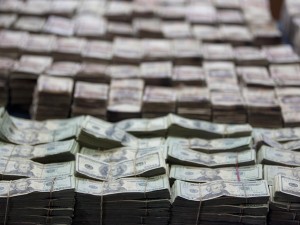Dollar, euro surge in Asian trade
TOKYO – The dollar traded close to the 100-yen level in Asia on Monday after G20 finance leaders gave a cautious thumbs up to Tokyo’s efforts to stoke growth with huge monetary easing.
The greenback fetched 99.85 yen in Tokyo morning trade, strengthening from 99.52 yen in New York late Friday, while the euro also gained at 130.46 yen from 129.94 yen in US trading. The dollar last hit 100 yen in April 2009.
The single European currency also fetched $1.3067 from $1.3057 in New York.
Investors were keeping a close eye on dollar-yen trading as the US unit flirts with a four-year high.
“The G20 effectively gave the green light for further yen weakness by supporting the aggressive easing by the Bank of Japan,” National Australia Bank said in a note.
Article continues after this advertisement“However the G20 did add that it would like to see Japan also detail the structural reforms it can take to further boost growth.”
Article continues after this advertisementThe finance chiefs of the G20, after a meeting in Washington, gave a cautious endorsement of Japan’s huge monetary stimulus programme, agreeing it was necessary to boost the country’s stagnant economy, which has suffered from years of falling prices that have crimped spending and new investment.
Japan’s latest policy actions “are intended to stop deflation and support domestic demand”, they said in a statement.
A senior US Treasury official, speaking on condition of anonymity, said Japanese officials had stressed how the moves would lift demand in the world’s third-largest economy, which has been struggling for two decades.
“The latest decision on quantitative easing remedies the situation that was building up for years,” said Russian Finance Minister Anton Siluanov, chair of the G20 meeting, at a news conference.
Tokyo has faced heavy criticism in recent months, particularly in Europe, that it was forcing down the value of the yen to help its hard-hit exporters, whose products become more competitive overseas when the yen weakens.
The Japanese currency has weakened significantly since the dollar hit a record low around 75 against the unit in late 2011.
Markets are also awaiting a string of US, Chinese and European economic data this week.
